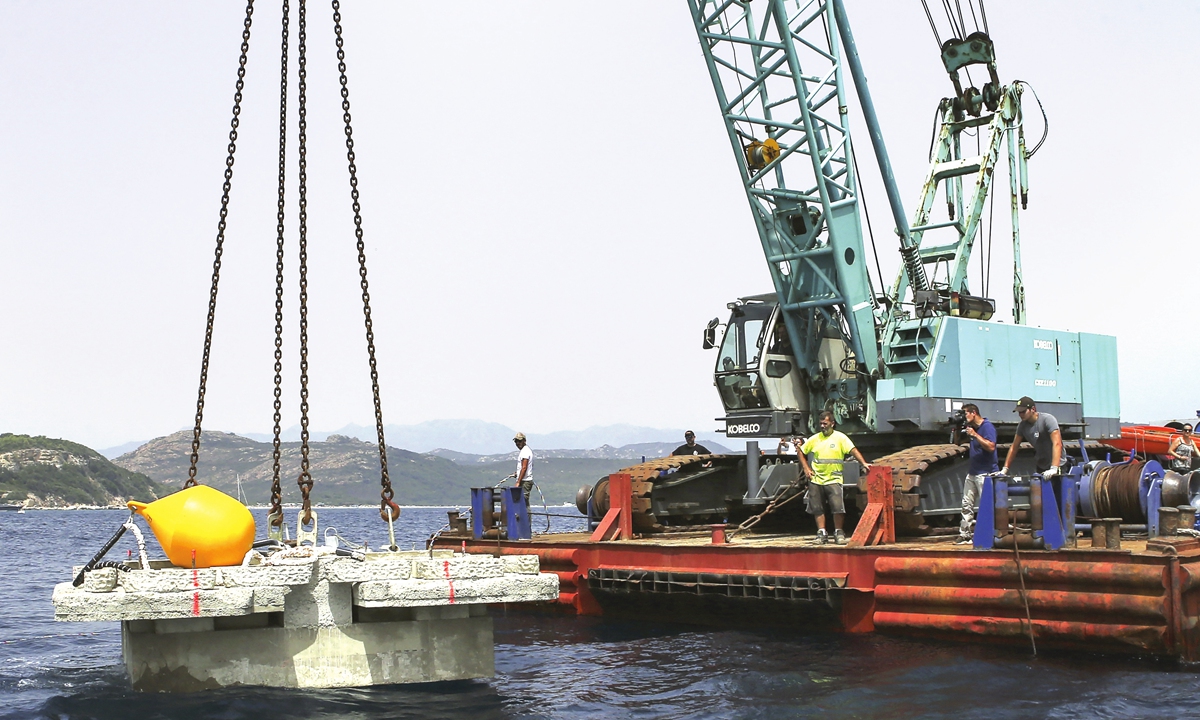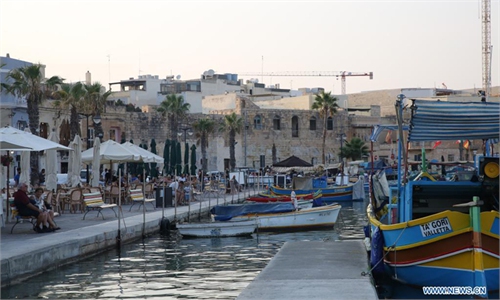
Workers anchor a yacht in the Sant' Amanza bay in the south of the French Mediterranean island of Corsica on August 11, 2021. Photo: AFP
In 2020, when France moved to protect Mediterranean seagrass beds by barring larger boats from dropping anchor near them, Yves-Marie Loudoux found himself adrift.
Captain of the 41-meter Ocean Sapphire, Loudoux remembers suddenly being unable to access his usual spots near fragile beds of so-called Neptune grass off the coast of Corsica.
"We had no solution, we were pushed to very inconvenient moorings too far from the coast," he recalls. "[Instead] we had to go to Sardinia in Italy nearby so that people could swim."
But today his clients - who pay some 110,000 euros ($130,000) per week to cruise the Mediterranean in style - can once again plunge into Corsican waters thanks to anchorages designed specifically to protect seagrass.
A total of 14 ecological moorings are planned for the Sant'Amanza bay to protect some 60 hectares of Neptune grass meadows, said Michel Mallaroni, director of the port of Bonifacio and head of the 2.3 million euro ($2.7 million) project.
"The challenge is to keep the southern tip of Corsica attractive for boaters while protecting the environment," he said.
Vital role
Unique to the Mediterranean, Neptune grass is one of 70 species of marine seagrass growing in vast underwater meadows from the Arctic to the tropics.
The plants play a vital role in improving water quality, absorbing carbon dioxide, and exuding oxygen, and provide a natural nursery and refuge for hundreds of species of fish.
Earlier in 2021, it was even discovered that Neptune grass helps remove plastic from Mediterranean waters, trapping it in its leaves and forming balls that wash up on shore.
But the fragile ecosystems have come under increasing threat from human activity, with boat anchors as a major culprit.
An estimated 7,500 hectares of Neptune grass meadows have been damaged along the French coast alone, and in 2020 the country made it illegal for boats measuring longer than 24 meters to drop anchor within designated zones.
"The orders by the maritime prefecture outlawing mooring in certain zones of the Mediterranean for the protection of Neptune grass were historic," scientist and environmentalist Charles-Francois Boudouresque told AFP.
And with so many large yachts depending on stops along France's famed Cote d'Azur and in Corsica, the decision had a significant financial risk attached.
Ecological moorings
The solution: ecological moorings that "adapt to the sea floor by mimicking it" with a rough surface that "makes it easier for biodiversity to take hold," said Line Babiol of the BRL engineering firm.
She explains that the underwater components have cavities that allow fish inside and "don't impact the movement of the water."
On the surface, floating chests attached to the concrete below allow boats of up to 60 meters to safely moor - without dropping anchors that could tear up the seagrass below.
For captain Loudoux, the anchorages are a highly-anticipated solution.
"The more moorings like this, the more people will be drawn to the sublime Corsican coasts again," he said.
According to Mallaroni, some 44 percent of leisure boats navigating off Corsica stop in Bonifacio, with the majority of vessels measuring over 24 meters.
The traffic accounted for 60 percent of the port's revenues in 2019, he said.
With additional income that has been generated by their wealthy passengers, boats stopping in Bonifacio are a vital source of income to the town's 3,000 inhabitants.
Mallaroni says some 90 moorings are needed along the island's shores, citing the French Federation of Nautical Industries.
Example for other countries
On the mainland, a first ecological mooring off Pampelonne beach near Saint Tropez on France's famed Cote d'Azur should be available by 2022.
Two other sites are in development, including one in the Calanques national park between Marseille and Cassis that should be operational by 2024.
In the meantime, the seagrass zones remain off-limits to boaters - although the authority responsible for enforcing rules has so far only issued warnings.
"Most of the boaters pull up their anchors and move to authorized zones," says Thibault Lavernhe of the Maritime Prefecture of the Mediterranean.
"But there have been several repeat offenders and eventually sanctions will have to be applied," he says, with a maximum penalty of 150,000 euros and a year in prison at stake.
Environmentalist Boudouresque meanwhile expressed his hope that other countries - both Mediterranean and beyond - with Neptune grass ecosystems will adopt similar rules - and solutions.
"The environment has no borders," says Boudouresque.
"Other Mediterranean countries should get inspired by these protective measures."

